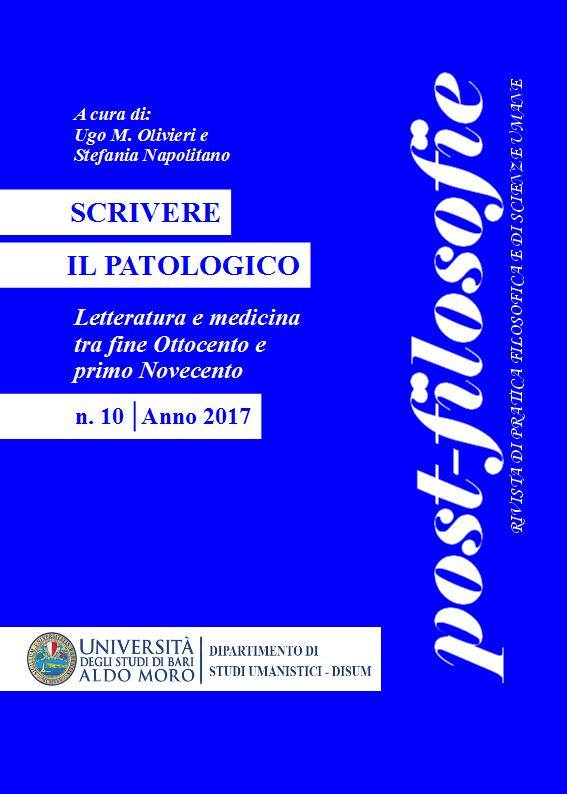Dal delirio delle donne: profili modernisti del sé nel segno della depersonalizzazione
DOI:
https://doi.org/10.15162/1827-5133/1060Parole chiave:
corpo femminile, Döblin, Marinetti, modernità / Döblin, female body, modernityAbstract
Il saggio mette a confronto Alfred Döblin e Marinetti a partire dalla posizione dell'artista rispetto al mondo presente. La questione investe tanto l'apporto critico o di adesione nel caso di Marinetti verso il rapido sviluppo tecnologico della società europea, quanto il fattore materiale, corporeo come segno di disagio o di ritardo rispetto alla rapida trasformazione a cui è chiamata l'umano. Il coinvolgimento dell'erotismo nei due autori consente di mettere a fuoco l'approccio discriminante di Marinetti e del futurismo verso il "femminile" emergenti nello spazio politico e estetico all'inizio del Novecento.
The essay compares Alfred Döblin and Marinetti starting from the artist’s attitude towards the present world. The question concerns Marinetti’s critical contribution and support to the rapid technological development of the European society, as well as the material and corporeal factor, a sign of distress or delay in relation to the rapid transformation that humans are facing. The theme of eroticism in both authors allows us to focus on Marinetti and Futurism’s discriminating approach to the "female", emerging from the political and aesthetic framework of the early twentieth century.
Riferimenti bibliografici
DESSOIR M., Objektivismus in der Ästetik, in. M. Dessoir Beiträge zur allgemein Kunstwissenschaft, Enke, Stuttgart 1929.
DÖBLIN A., Futuristische Worttechnik. Offener Brief an F. T. Marinetti, Der Sturm, 150/151, 1913.
– An Romanautoren und ihre Kritiker, p. 119-123, qui p. 122 e s.
KRISTEVA J., Pouvoirs de l'horreur. Essai sur l'abjection, Le Seuil, Paris 1980.
KOSCHORKE A., Die Männer und die Moderne, a cura di W. Asholt e W. Fähnders, Der Blick vom Wolkenkratzer : Avantgarde, Avantgardekritik, Avantgardeforschung , Springer, Amsterdam 2000, pp. 141-162.
MARINETTI F.T., Il Manifesto futurista, Der Sturm 2/2, 1911/12, p. 828- 829.
– La letteratura futurista. Der Sturm 2, 1912, pp. 194-195.
SCHÄFFNER W., Die Ordnung des Wahns. Zur Poetologie psychiatrischen Wissen bei Alfred Doeblin, : Fink, München 1995.
SIMMEL G., La metropoli e la vita dello spirito, a cura di P. Jedlowski, Armando Editore, Roma1995.
VINKEN B., Make war not love: Pulp Fiction oder Marinettis Mafakra, a cura W. Asholt e W. Fähnders, Der Blick vom Wolkenkratzer : Avantgarde, Avantgardekritik, Avantgardeforschung , Springer, Amsterdam 2000, pp. 183-203.
Downloads
Pubblicato
Fascicolo
Sezione
Licenza
“Post-Filosofie” utilizza Open Journal Systems 2.4.8.5, che è un software open source per la gestione e la pubblicazione di riviste sviluppato, supportato e distribuito gratuitamente dal Public Knowledge Project sotto la GNU General Public License.
Gli autori che pubblicano su questa rivista accettano le seguenti condizioni:
- Gli autori mantengono i diritti sulla loro opera e cedono alla rivista il diritto di prima pubblicazione dell'opera, contemporaneamente licenziata sotto una Licenza Creative Commons - Attribuzione che permette ad altri di condividere l'opera indicando la paternità intellettuale e la prima pubblicazione su questa rivista.
- Gli autori possono aderire ad altri accordi di licenza non esclusiva per la distribuzione della versione dell'opera pubblicata (es. depositarla in un archivio istituzionale o pubblicarla in una monografia), a patto di indicare che la prima pubblicazione è avvenuta su questa rivista.
- Gli autori possono diffondere la loro opera online (es. in repository istituzionali o nel loro sito web) prima e durante il processo di submission, poichè può portare a scambi produttivi e aumentare le citazioni dell'opera pubblicata (Vedi The Effect of Open Access).
"Post-Filosofie" uses Open Journal Systems 2.4.8.5, which is an open source journal management and publication software developed, supported and distributed free of charge by the Public Knowledge Project under the GNU General Public License.
Authors publishing in this journal accept the following conditions:
- Authors retain the rights to their work and assign to the journal the right of first publication of the work, simultaneously licensed under a Creative Commons Licence - Attribution that allows others to share the work indicating intellectual authorship and first publication in this journal.
- Authors may enter into other non-exclusive licensing agreements to distribute the published version of the work (e.g., deposit it in an institutional repository or publish it in a monograph), as long as they indicate that the first publication was in this journal.
- Authors may disseminate their work online (e.g. in institutional repositories or on their website) before and during the submission process, as it may lead to productive exchanges and increase citations of the published work (See The Effect of Open Access).







